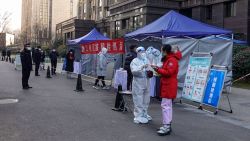China says the worst of its pork crisis might be over, but some analysts say it’s still too soon to give the all-clear.
The number of breeding pigs in China picked up slightly in October compared to the month before, according to data released by the Ministry of Agriculture and Rural Affairs last week. It was the first increase since April 2018, a few months before African swine fever began ravaging farms across the country.
The illness not only killed pigs, but also made farmers reluctant to restock pigs after they were slaughtered out of fear they would catch the disease. That caused the total pig population to shrink by around 130 million, or more than 40%, as of September, according to a CNN Business analysis of official data.
The latest data on breeding pigs indicates that the problem has “basically reached a bottom,” the agricultural ministry said during a press conference last week. That’s because it shows that farmers are now more willing to raise pigs.
Yang Zhenhai, the ministry’s director for livestock and veterinarians, said the total pig population could stop declining by the end of this year. The ministry’s own targets are aggressive, too: It expects China’s pig herd to recover to 80% of pre-crisis levels by the end of 2020.
That would be particularly good news for consumers, who have had to absorb massive pork price increases caused by the meat shortage. Pork is a stapleof the country’s diet, making the problem a major pain point.
While prices are still high — more than double what they were at this time last year — the cost of pork is now dropping, according to data released Tuesday by the Ministry of Commerce. Pork prices fell nearly 9% last week, the third straight week of declines.
But analysts warn that the crisis might not be bottoming out just yet. China’s most important holiday season, Chinese New Year, is still a couple of months away. Rising pork prices are “inevitable” before then, said Xie Zhiyou, an agricultural industry analyst for China Galaxy Securities.
“A peak season for pork consumption is coming,” he said, adding that he expects prices to continue increasing until at least the middle of next year.
The government has tried to curb the soaring prices by increasing imports. China expects to import more than three million tons of pork this year, a spokesman for the Ministry of Commerce said Thursday. That’s 40% more than last year.
Xie also said he found it “impossible” for China’s pig herd to rebound significantly until a vaccine for African swine fever hits the market.
So far, there is no commercially available vaccine for the disease, though the Chinese government has been actively supporting research. No organization or individual has applied for clinical tests yet, said Yang, the livestock director, during last week’s press conference.
Analysts at TF Securities, a firm based in Wuhan, China, were also pessimistic. They estimated that China is short ofbetween 15 million and 20 million tons of pork — and that a deficit could persist for the next two or three years.
























